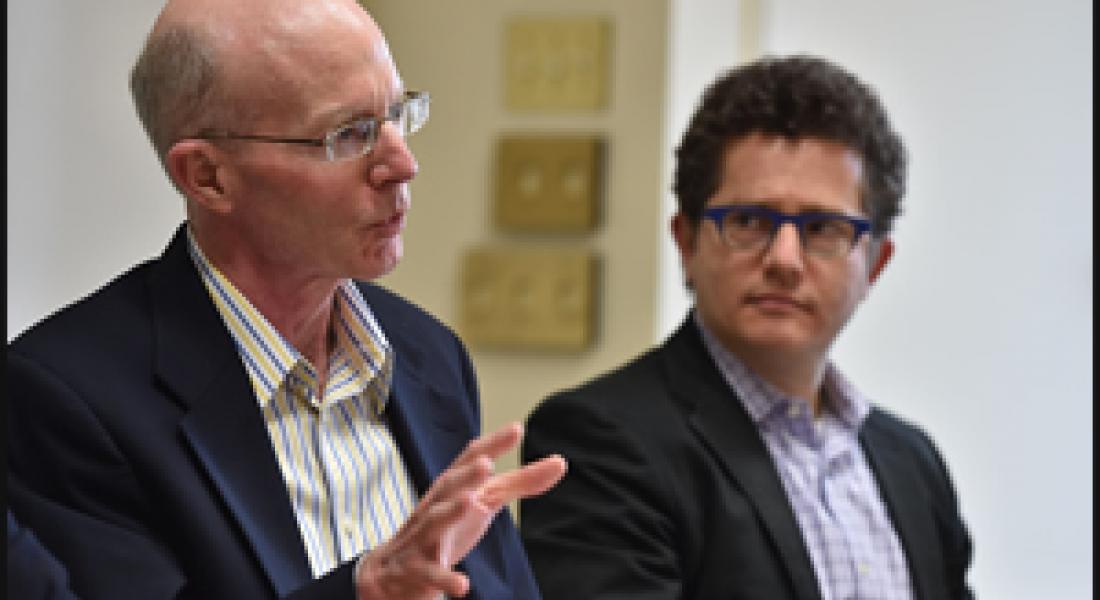
Democracy in Brazil and the phenomenon of “authoritarian successor parties” around the world were the focus of two dynamic Kellogg gatherings of social scientists co-organized by Faculty Fellow Scott Mainwaring in spring 2015. Held back-to-back in April, each drew what one participant called “a virtual who’s who” of scholars in the field.
In an unusual collaboration, junior scholars conceptualized each event—one a book conference on an innovative topic and the other a celebratory workshop aiming to strengthen emerging scholarship—and then worked with Mainwaring to bring them to fruition.
“Both these gatherings brought together distinguished and younger scholars for some excellent discussions of real importance to the world,” said Mainwaring. “The two events signal the Kellogg Institute’s prominence as a center for the study of democratization.”
“Life After Dictatorship: Authoritarian Successor Parties Worldwide”
Since the mid-1970s, democracy has taken hold on an unprecedented scale. However, this has not always meant the marginalization of former authoritarian incumbents,” said conference co-organizer James Loxton, a visiting fellow who begins a new post at the University of Sydney this fall. “They have often remained key players in the new democratic regimes, and in many countries have even been elected back into office.”
Despite this prominent role, parties that emerge from authoritarian regimes have not received the level of attention that they deserve, he believes.
For better or worse, authoritarian successor parties are a normal part of the democratization experience,” said Loxton. “This two-day international conference represented an important step in launching a new research agenda comparing such parties worldwide.
Leading experts on political parties and democratization in Africa, Asia, Europe, and Latin America came together to exchange ideas about why authoritarian successor parties exist, why some are more successful than others, and what their effects are on democracy.
Conference participants contributing papers included current and former visiting fellows Steve Levitsky, Timothy Power, Rachel Beatty Riedl, Kenneth Roberts, and Matthew Singer as well as distinguished scholars Herbert Kitschelt and Daniel Ziblatt, among others. Kellogg faculty fellows and PhD fellows served as discussants.
“We were hoping that the conference would trigger a lively conversation—and it did,” said Loxton.
The organizers dispensed with paper presentations and asked participants to read all the papers in advance. Following brief comments by the discussants, the discussions were constructive, deeply informed, and even passionate, as scholars pushed one another to improve their work and traded examples of relevant cases from around the world.
A subsequent Kellogg-sponsored panel on the topic at the Latin American Studies Association (LASA) International Congress in May generated considerable interest in the collected volume that will be a principal outcome of the conference.
“We think it has the potential to be a major scholarly work, given the high caliber of the participants, the intrinsically interesting nature of the topic, and the fact that authoritarian successor parties are so widespread,” said Loxton.
“Thirty Years of Democracy in Brazil: A Research Workshop”
PhD Fellow Fernando Bizzarro and Dissertation Year Fellow Nara Pavão had a clear vision for the one-day workshop they co-organized with Mainwaring. It would celebrate 30 years of democracy in Brazil; strengthen and promote the scholarship of PhD students studying the country’s politics; and reinforce the Kellogg Institute’s long-standing connections to Brazilian institutions and scholars.
Drawing on the Kellogg network, the organizers gathered a stellar line-up of experts on Brazil to present in two public panels.
The first, “30 Years of Brazil's Democracy,” featured Mainwaring and noted scholars José Antonio Cheibub, David Samuels, and Eduardo Viola debating the “arc of Brazilian democracy” and its contemporary challenges. The second, “The Next 30 Years,” brought together Andréa Freitas and Bruno Reis with Faculty Fellow Ann Mische to focus further on those challenges and look to the future.
“It is no longer the case that we worry if democracy in Brazil is going to work or not,” said Cheibub, setting the tone for the day’s discussion. (See panel videos here and here.)
The panels served as bookends to the day’s working sessions focusing on 14 papers on Brazil presented by PhD students in political science. Four Kellogg-affiliated students from Notre Dame and 10 Brazilian students studying elsewhere in the United States received rigorous feedback on their work from leading scholars who, as Samuels pointed out, were not their dissertation advisors.
“This event was one of the most positive experiences I have had in graduate school,” said Pavão, who receives her PhD in August and will be a post-doc at Vanderbilt University in the fall.
“Following the workshop, Kellogg is more than ever a reference of academic support for scholarship on Brazilian democracy,” said Bizzarro, noting that the reach of the gathering was multiplied through social media. Both graduate student organizers are appreciative of the boost the workshop has given them in the larger community of Brazilians and Brazilianists.
“This will certainly pay off in our career prospects, becoming another major contribution from the Kellogg to our formation as researchers and academics,” said Bizzarro.
In a fascinating footnote, several of the workshop participants spent time at the Kellogg Institute more than 30 years ago, when Brazil’s democratic transition was still in the future.
Viola and Mainwaring were among the Institute’s first visiting fellows in 1983, as was Fábio Wanderley Reis, “one of the most important Brazilian political scientists ever,” according to Bizzarro.
Bruno Reis, Fábio’s son, who recalled being at Kellogg with his father when he was 18, told the workshop organizers he was honored and deeply touched by the invitation to return to the Institute that had hosted them so many years ago.





